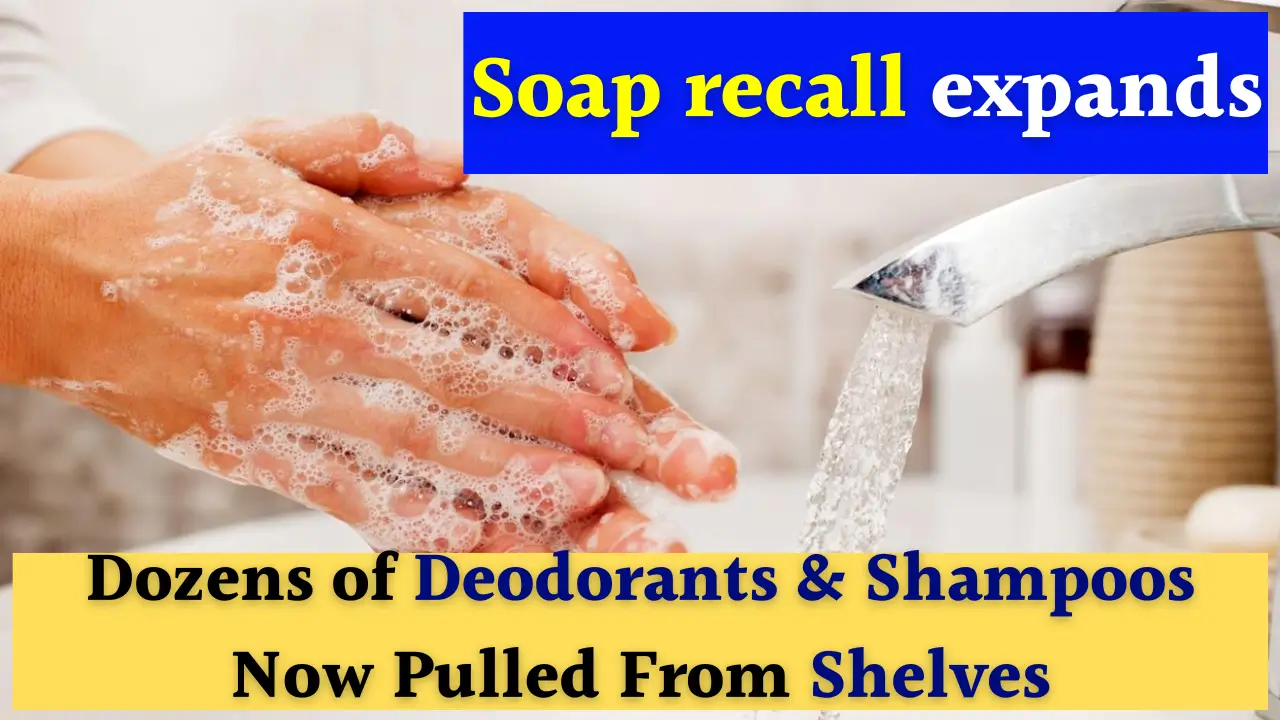In a sweeping consumer safety action, regulatory authorities and manufacturers have issued an expanded recall covering several popular soaps, deodorants, and shampoos.
The decision comes after routine testing indicated the possible presence of harmful levels of benzene and other contaminants. This move has raised widespread concerns about personal care products and their safety on supermarket shelves.
Overview of the Expanded Personal Care Product Recall
The recall, which initially focused on selected soap products, has now been widened to include a variety of deodorants and shampoos sold under major retail and cosmetic brands. Manufacturers, in compliance with consumer product safety agencies, have voluntarily pulled these products to prevent potential health risks.
Benzene, a chemical linked to long-term health effects such as certain cancers, was detected in some batches. Additional concerns included contamination from inconsistencies in production and faulty preservation of personal care goods. This recall has affected products distributed widely across the USA, from convenience shops to major retail chains.
The expansion of the recall demonstrates the seriousness with which regulators are addressing consumer safety, particularly in an industry where millions of people rely on self-care and hygiene products daily.
Why the Recall Was Expanded
Initially, only a handful of soaps were identified for possible contamination. However, with deeper inspections and broader testing, regulatory investigators found additional risks in deodorant sprays, roll-ons, and certain shampoo products. These toiletries often share the same production and storage facilities, increasing the possibility of cross-contamination.
Shampoos and deodorants, like soaps, involve diverse chemical preservatives and stabilisers. If contaminated with benzene or unsafe microbial levels, they could pose immediate and long-term risks. Because of this, global health and safety protocols recommend swift removal from the retail environment to minimise consumer exposure.
Health Concerns Linked to Contaminants
Benzene contamination is at the centre of the recall crisis. While small amounts of benzene may be tolerated through environmental exposure, regular or excessive exposure can have serious implications.
- Long-term exposure is linked with diseases like leukaemia and blood disorders.
- Inhalation or skin absorption may cause dizziness, headaches, and irritation.
- Continuous use of contaminated hair and body products could increase daily exposure beyond safe limits.
Apart from benzene, some recalled shampoos and soaps were found to contain unsafe microbial elements. Poor formulation of preservatives can allow bacteria and mould to thrive, representing a risk for infections, particularly among users with sensitive skin or compromised immunity.
Brands and Products Impacted by the Recall
A wide range of household and personal-care brands have been touched by the expanded recall. While specific product names and affected batch codes vary, most of these items fall within aerosol deodorants, liquid shampoos, and large-scale soap ranges. Customers are being urged to check packaging details, lot numbers, and expiry dates.
Representative Table of Affected Product Categories
| Product Type | Common Forms Affected | Safety Risk Identified | Recall Status |
|---|---|---|---|
| Soaps | Bar soaps, liquid body washes | Benzene traces / microbial | Nationwide recall |
| Deodorants | Aerosol sprays, roll-ons | High benzene exposure risk | Nationwide recall |
| Shampoos | Liquid shampoos, 2-in-1 blends | Microbial growth, benzene | Ongoing collection |
This table illustrates the scale of categories included, though individual product lists vary by retailer and distribution channel.
Guidance for Consumers
Consumers who have purchased any suspected soaps, deodorants, or shampoos are strongly advised to:
- Cease use immediately, regardless of whether they notice any health symptoms.
- Store recalled items in a secure place away from children and pets, prior to safe disposal.
- Contact retailers or brand helplines for refund or replacement guidance.
Healthcare providers recommend monitoring for unusual symptoms such as skin irritation, respiratory difficulties, or persistent headaches. For those who have used affected batches over a prolonged period, medical consultation may provide reassurance and necessary health checks.
Manufacturer and Retailer Responsibility
In the current recall, manufacturers have taken voluntary corrective measures, but regulatory bodies continue to supervise compliance. Retailers have been instructed to remove all affected products from sale immediately, and warehouses have been placed under scrutiny for possible contamination control lapses.
This highlights the shared responsibility between corporations and oversight agencies. Transparent communication with consumers and speedy product withdrawal serve as essential components of public health protection. Failure to act promptly could expose companies to liability claims and regulatory sanctions.
Broader Impact on the Personal Care Industry
The incident has reignited debates about chemical usage in personal care manufacturing. Benzene, although not intentionally added to soaps, sprays, or shampoos, can appear due to impurities in raw materials and aerosols. With consumer awareness increasing, the industry faces rising pressure to ensure stricter quality control.
Additionally, this recall underscores the need for:
- More routine batch testing to detect contaminants before circulation.
- Evaluation of chemical formulations with updated safety benchmarks.
- Stronger labelling standards that highlight potential risks to users.
This event may affect consumer trust, prompting a surge in demand for certified organic, benzene-free, and preservative-safe labels.
Steps Being Taken to Prevent Future Incidents
Regulatory organisations and large manufacturers have stepped up corrective action, such as:
- Enhancing chemical screening levels and routine testing of aerosol and liquid batches.
- Reviewing factory emission controls and packaging sterilisation standards.
- Establishing clearer public communication channels to address consumer queries directly.
These preventive steps aim to restore confidence in personal care markets and assure consumers that their hygiene essentials are safe.
FAQs
1. Why were deodorants included in the soap recall?
Deodorants were found to share contamination risks, particularly with benzene in aerosol sprays.
2. What health risks are linked to benzene exposure?
Benzene exposure is associated with dizziness, headaches, irritation, and long-term risks like leukaemia.
3. How can consumers identify recalled products?
Checking batch codes, expiry dates, and recall notices on packaging helps determine if a product is affected.
4. Will retailers replace recalled products?
Most major retailers offer refunds or replacements following recall instructions.
5. What should I do if I already used a recalled shampoo or soap?
Stop usage immediately and seek medical advice if you experience unusual symptoms.
Conclusion
The expanded recall of soaps, deodorants, and shampoos is a crucial reminder of the importance of product safety in the daily consumer market. Benzene contamination and microbial growth risks make it clear that rigorous manufacturing checks and transparent recall systems are essential in protecting public health.
While the inconvenience of taking products off shelves is significant, it is outweighed by the responsibility to protect millions of consumers who rely on these everyday goods. Long-term solutions must focus on accountability, stricter safety regimes, and better consumer awareness.



